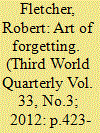| Srl | Item |
| 1 |
ID:
116884


|
|
|
|
|
| Publication |
2012.
|
| Summary/Abstract |
This article explores the implications of a phenomenon that, following Renato Rosaldo's influential discussion of 'imperialist nostalgia', I call 'imperialist amnesia': the fetishistic disavowal of the legacy of European colonisation within contemporary postcolonial societies. I describe the manifestation of this amnesia in discourses as diverse as academic scholarship, international development and travel writing. Observing the recurrence of imperialist amnesia in the face of persistent attempts to historicise postcoloniality, I propose that the disavowal of colonialism functions as what Michael Taussig calls a 'public secret'-something commonly known but not generally acknowledged-helping to efface the grim realities of the colonial enterprise. Public secrecy by its nature defies most attempts at disclosure; hence efforts to publicise colonialism's contemporary influences may paradoxically reinforce their obfuscation by perpetuating the very imperialist amnesia they seek to dispel.
|
|
|
|
|
|
|
|
|
|
|
|
|
|
|
|
| 2 |
ID:
134641


|
|
|
|
|
| Summary/Abstract |
Despite sustained critique of a neo-Malthusian focus on ‘overpopulation’, the issue continues to resurface regularly within international development discourse, particularly with respect to ‘sustainable’ development in relation to growing environmental security concerns. This suggests that the issue defies purely rational evaluation, operating on a deeper psychodynamic register. In this paper we therefore analyse the population question as a ‘scapegoat’, in the psychoanalytic sense of a fantasmatic construction concealing the gap between the symbolic order of international development and its persistent failure in practice. By conjuring the age-old image of animalistic barbarian hordes breeding inexorably and therefore overflowing their Third World confines to threaten the security – and enjoyment – of wealthier nations, the overpopulation bogeyman helps to displace attention from systemic issues within the political economy of development, namely, the futility of pursuing sustainable development within the context of a neoliberal capitalism that characteristically exacerbates both economic inequality and environmental degradation.
|
|
|
|
|
|
|
|
|
|
|
|
|
|
|
|